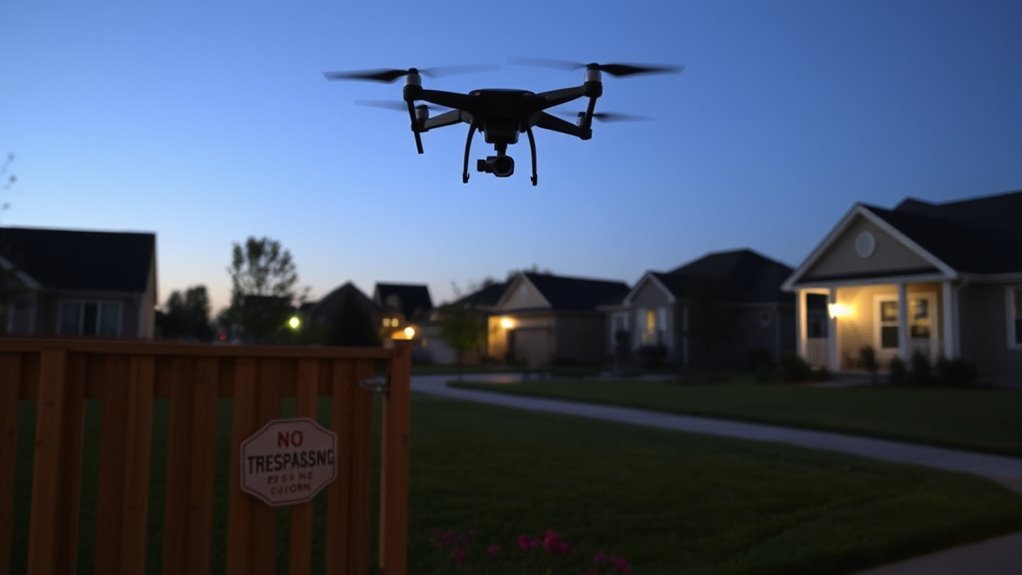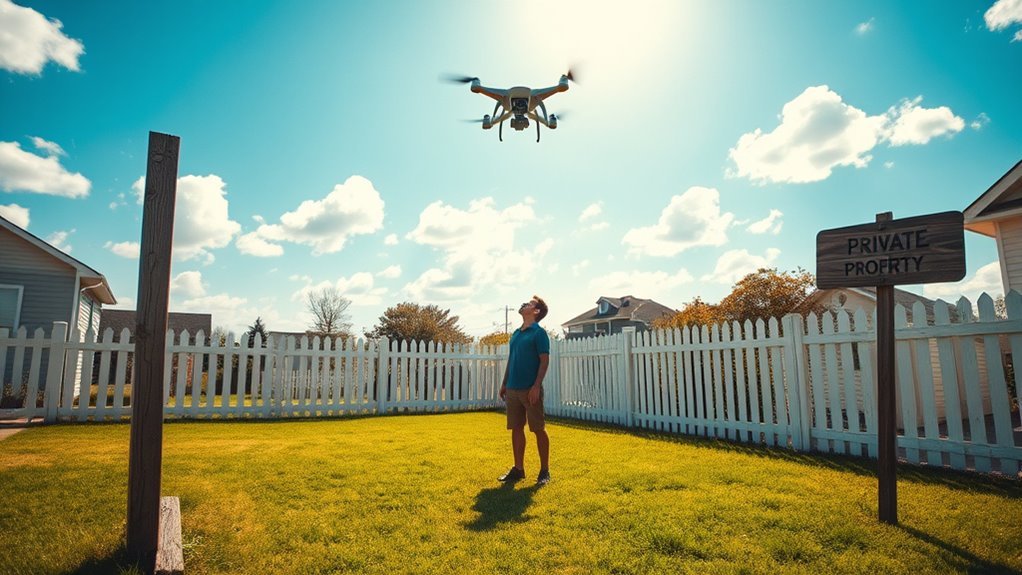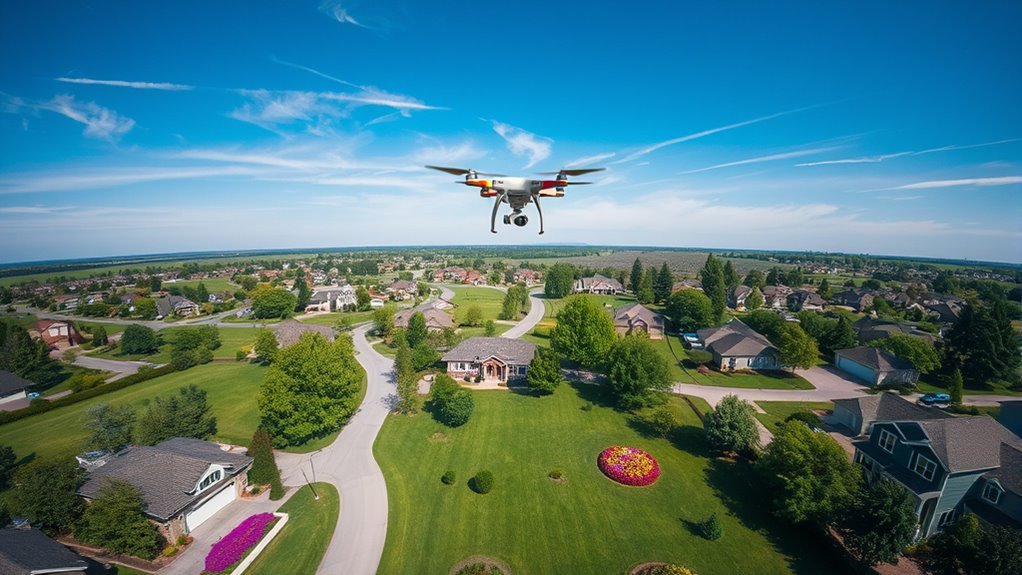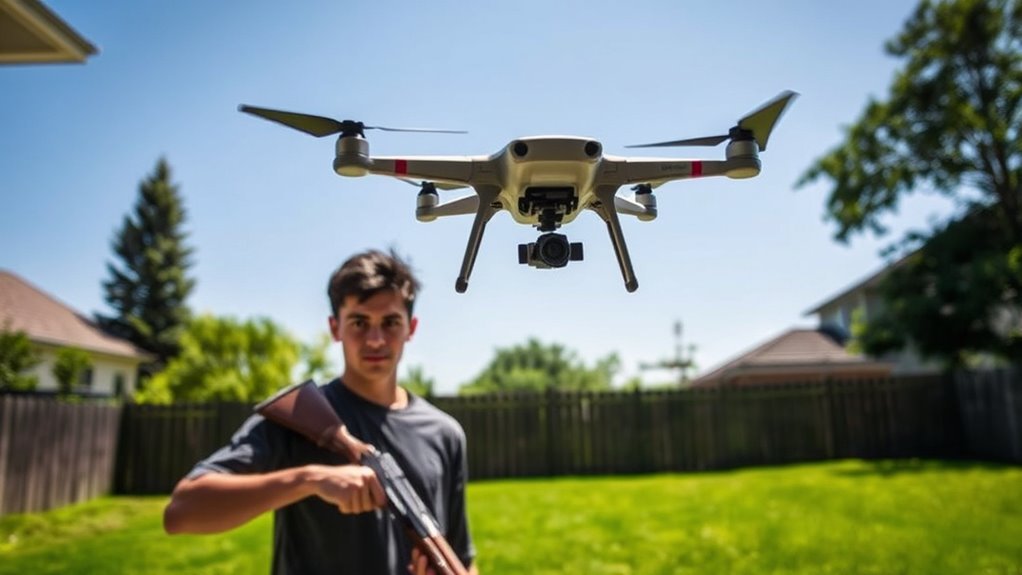To determine if it’s illegal to shoot a drone over your property, you need to understand federal, state, and local regulations. The FAA governs airspace, and shooting down a drone may violate these laws. State laws can vary; some may permit defensive action, while others prohibit interference. Local ordinances may impose stricter rules. Engaging in illegal actions may lead to serious legal repercussions. There are alternatives to contemplate that could help resolve the situation without resorting to force.
Understanding Drone Regulations

Understanding drone regulations is essential for anyone considering shooting a drone over their property, especially since laws can vary considerably by location. To maintain drone safety, you must be aware of the airspace you’re operating in. Many areas have specific restrictions regarding drone use, including no-fly zones and altitude limits. If you’re contemplating taking action against a drone, you should first assess whether it’s intruding on your privacy or violating your rights. Keep in mind that discharging a firearm or using other methods to shoot down a drone can lead to legal repercussions, even if you believe it’s justified. Always stay informed about local laws and regulations to guarantee you’re acting within your rights while respecting airspace awareness. Additionally, understanding federal aviation laws is crucial to avoid potential legal issues when dealing with drones. Remember that drones fall under federal laws protecting aircraft, which further complicates the legality of using force against them.
Federal Laws Governing Drones

While federal laws governing drones are complex, they primarily fall under the jurisdiction of the Federal Aviation Administration (FAA). You need to understand that federal drone regulations dictate how drones can operate in national airspace, ensuring safety and efficiency. The FAA guidelines specify operational limits, such as altitude caps and no-fly zones, which drone operators must adhere to. It’s essential to note that these regulations apply regardless of property ownership; you can’t just shoot down a drone because it’s over your land. Violating FAA guidelines could lead to severe penalties, including fines. Consequently, familiarizing yourself with these federal regulations not only helps protect your rights but also keeps you compliant with the law.
State Laws and Variations

When considering the legality of shooting a drone over your property, it’s vital to recognize that state-specific regulations can vary considerably. Some states have enacted laws that specifically address drone use and property rights, while local ordinances may impose additional restrictions. Understanding these variations is essential to guarantee compliance and avoid legal repercussions.
State-Specific Regulations
As drone usage continues to rise, it’s vital to recognize that state-specific regulations can vary considerably regarding the legality of shooting a drone over your property. Some states have stringent state drone rules that prohibit any form of interference, including shooting, while others may allow defensive actions under specific circumstances. Regional enforcement plays an important role in how these laws are applied, with local law enforcement agencies often interpreting state laws differently. Consequently, you should familiarize yourself with your state’s regulations to avoid legal repercussions. Understanding these nuances can empower you to make informed decisions about your rights and responsibilities concerning drones that may infringe upon your privacy or property. Always consult legal resources for the most accurate information.
Local Ordinance Differences
Local ordinances can greatly influence the legality of shooting a drone on your property, even when state laws may seem permissive. It’s crucial to recognize that local regulations can impose stricter standards than state laws, dictating what actions you can take against intrusive drones. For instance, some municipalities may outright prohibit the discharge of firearms, including in defense of property. Ordinance enforcement can vary widely, meaning what’s acceptable in one town might be illegal in another. Consequently, before taking any action, you should familiarize yourself with your local laws. This understanding not only protects your rights but also guarantees you’re acting within legal boundaries, promoting a responsible approach to maintaining your property’s privacy.
Local Ordinances and Restrictions
Understanding the local ordinances and restrictions surrounding drone use is vital, especially since regulations can vary considerably from one jurisdiction to another. In many areas, laws may define drone privacy and aerial trespass, impacting how you can respond to unwanted drones over your property. Some localities might have specific rules prohibiting the shooting down of drones, even if they invade your airspace. Others may allow you to take action if you can prove the drone is violating your privacy or trespassing. To protect your rights, it’s important to research your local laws carefully. Always stay informed about any updates or changes in regulations to guarantee you’re acting within the legal framework while safeguarding your freedom and privacy.
Property Rights and Airspace
While local ordinances play a significant role in dictating how you can respond to drones over your property, the concept of property rights and airspace introduces another layer of complexity. Understanding your airspace boundaries is essential for asserting your property ownership. Here are key points to take into account:
- Airspace isn’t just open; it has defined legal limits.
- You may have rights to the airspace above your property, but these can vary.
- Federal regulations often govern airspace use, complicating state and local laws.
- Your responses to drone incursions must align with both property rights and aviation laws.
- Therefore, federal laws regulate drone use to ensure safety and privacy in national airspace. Additionally, drones over 250 grams must be registered with the Federal Air Transport Agency to ensure compliance with legal standards.
Balancing your rights with existing regulations can help protect your property while ensuring you remain compliant with the law.
Self-Defense vs. Property Defense
When faced with a drone hovering over your property, you might instinctively consider whether to act in self-defense or to protect your property rights. Self-defense laws typically apply to imminent threats to your safety, while property defense focuses on safeguarding your belongings. If the drone poses a direct threat to your person, self-defense could be justified; however, if it merely invades your airspace, the situation leans toward property defense. Understanding the distinction is vital, as the legal implications differ considerably. Courts may not recognize property defense in the same light as self-defense, so you should weigh the risks carefully. Evaluating your options helps guarantee you act within your rights while maintaining a commitment to personal freedom and responsible action.
Possible Consequences of Shooting a Drone
If you shoot a drone over your property, you could face significant legal repercussions, including criminal charges. Additionally, the drone’s owner may pursue civil liability claims against you for damages. It’s crucial to understand these potential consequences before taking any action.
Legal Repercussions
Shooting a drone over your property can lead to serious legal repercussions, particularly since laws governing airspace and property rights can be complex and vary by jurisdiction. Understanding the legal implications of your actions is essential for any drone owner. Here are some potential consequences you might face:
- Criminal charges: Discharging a firearm can lead to felony or misdemeanor charges.
- Fines: You could incur hefty fines for violating airspace regulations.
- Civil lawsuits: Property owners can sue for damages related to drone ownership.
- Loss of rights: Engaging in illegal actions may jeopardize your ability to fly drones in the future.
Always weigh your rights against the laws in your area to avoid severe penalties.
Civil Liability Issues
Civil liability issues can arise when you shoot a drone over your property, potentially leading to significant financial repercussions. If you claim drone trespass, proving the drone was unlawfully invading your airspace is essential. However, if the drone’s operator files a lawsuit, you might face civil liability for property damage, personal injury, or even emotional distress. Courts often evaluate whether your response was reasonable and proportionate to the perceived threat. This means you could end up paying hefty damages if deemed excessive. Understanding these potential consequences is important, as they can outweigh the initial satisfaction of asserting your rights. Always consider non-lethal alternatives and consult legal counsel to navigate the complexities of civil liability concerning drones.
Alternatives to Shooting Down a Drone
While the temptation to shoot down a drone hovering over your property may be strong, there are several alternatives that can address your concerns without resorting to illegal actions. Exploring peaceful resolution is essential. Consider these options instead:
The urge to confront a hovering drone is natural, but consider peaceful alternatives that respect the law and promote understanding.
- Contact the drone operator: If safe, ask them to move on.
- Use drone capture techniques: Employ nets or other non-destructive methods to manage the drone. Understanding drone regulations is essential to ensure you are operating within legal boundaries.
- Document the incident: Take photos or videos for evidence of any privacy violations.
- Set up signage: Clearly indicate your property boundaries and privacy preferences.
Additionally, implementing proactive vulnerability identification can help ensure your privacy is respected and your rights are protected in the digital age. These alternatives provide a constructive way to handle the situation while respecting laws and your rights. It’s important to prioritize solutions that foster understanding rather than conflict.
When to Contact Law Enforcement
When should you consider contacting law enforcement about a drone hovering over your property? If you experience drone harassment—defined as repeated or intentional invasive actions by an operator—it’s essential to take action. Additionally, if the drone poses a safety risk or violates privacy rights, it’s time to reach out to authorities.
| Situation | Recommended Action |
|---|---|
| Drone is flying too low | Report to law enforcement |
| Drone is recording you | Document and report harassment |
| Drone interferes with safety | Immediate law enforcement response |
A timely law enforcement response can help address these issues effectively, helping to protect your rights and freedoms while ensuring safety.
Frequently Asked Questions
Can I Use a BB Gun to Shoot Down a Drone?
While you might think using a BB gun on a drone sounds like a fun solution, drone laws and property rights complicate matters. It’s vital to understand the legal implications before taking any action.
Are There Any Exceptions for Shooting Drones Near My Home?
When considering exceptions for shooting drones near your home, it’s essential to understand drone regulations and property rights. Generally, laws favor drone operators, limiting your ability to take action against them without facing legal repercussions.
What Should I Do if a Drone Is Bothering Me?
When a drone buzzes like a pesky fly, you’re facing drone harassment and a privacy invasion. Document the occurrences, communicate your concerns to the operator if possible, and consider reporting it to local authorities for assistance.
Can I Sue Someone for Shooting My Drone?
You can sue someone for shooting your drone, but legal implications depend on drone ownership rights and local laws. It’s essential to understand property laws and regulations regarding aerial devices to determine your options effectively.
How Can I Report a Drone That Is Violating Laws?
To report a drone violating regulations, first identify the specific drone regulations involved. Then, follow local reporting procedures, which may include contacting law enforcement or aviation authorities, ensuring you provide detailed information about the incident.

